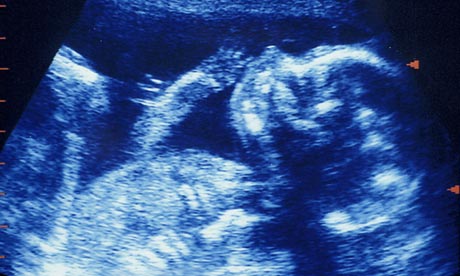
Scientists have developed a blood analysis that tells expectant mothers if they are carrying a child with Down's syndrome and hope to offer the test to all pregnant women.
The test could replace existing surgical techniques used to diagnose the genetic disorder in unborn babies. These techniques cause about one in 100 women to miscarry.
Researchers say the new test will be cheap and simple enough for doctors working in most clinics to screen any pregnant woman who requests it.
In a blind study of blood samples taken from 26 healthy pregnancies and 14 with Down's, the test correctly identified all cases of Down's syndrome with no false positives, though a larger clinical trial is needed to validate these results. Details of the test are described in the journal, Nature Medicine.
"The advantage is that we can introduce prenatal diagnosis for Down's syndrome to all pregnant women and it will have no risk for the baby," said Philippos Patsalis, who led the team at the Cyprus Institute of Neurology and Genetics in Nicosia.
"I believe that in less than two years we can have this in clinical practice," he told the Guardian.
"All pregnant women might want to carry out the test so they know if they are carrying a Down's syndrome pregnancy or not."
The syndrome is caused by the presence of extra genetic material from chromosome 21, which leads to learning difficulties, heart defects and a greater risk of dementia and leukaemia in later life. About one in 1,000 babies in Britain is born with the condition.
Scientists developed the test after research showed that genetic material shed by the unborn baby could be detected in the mother's bloodstream and used to spot the extra chromosome linked to Down's syndrome.
The test exploits the fact that regions of chromosome 21 from the baby carry more chemical tags, known as methylation, than the mother's DNA.
The test is one of a number under trial that may become a reliable means of diagnosing Down's and other genetic disorders. The NHS has poured £2m into developing a similar test.
In January, Dennis Lo at the Chinese University of Hong Kong, reported a test for the syndrome in the British Medical Journal that could reduce the number of invasive tests by 98%.
Doctors use a number of factors to assess a woman's risk of carrying a Down's baby, including her age, the levels of various proteins in her blood and the appearance of the baby in ultrasound scans.
Women deemed to be at risk are offered amniocentesis or chorionic villus sampling (CVS), which involve inserting a needle into the womb to retrieve amniotic fluid or cells from the placenta. Both have roughly a 1% risk of causing miscarriage.
Professor Lo, who is familiar with the latest test, said the impressive results need to be repeated in a larger group of people.
"If these data can be replicated by independent groups, then I think this would be a good non-invasive and risk-free method for the screening of Down's syndrome," he said.
Professor Nicholas Wald, an expert in Down's syndrome tests and director of the Wolfson Institute of Preventive Medicine at Bart's and the London NHS Trust, said: "The method is an exciting development. The challenge will be to see how well it works in larger numbers of patients, whether it is good enough to diagnose Down's syndrome and if not, whether it is suitable as a screening test."
• This article was amended on 8 March 2011. The original didn't make clear that the accuracy of the test was gauged using women already known to be carrying a Down's child or who had been given the all-clear. This has been corrected.

